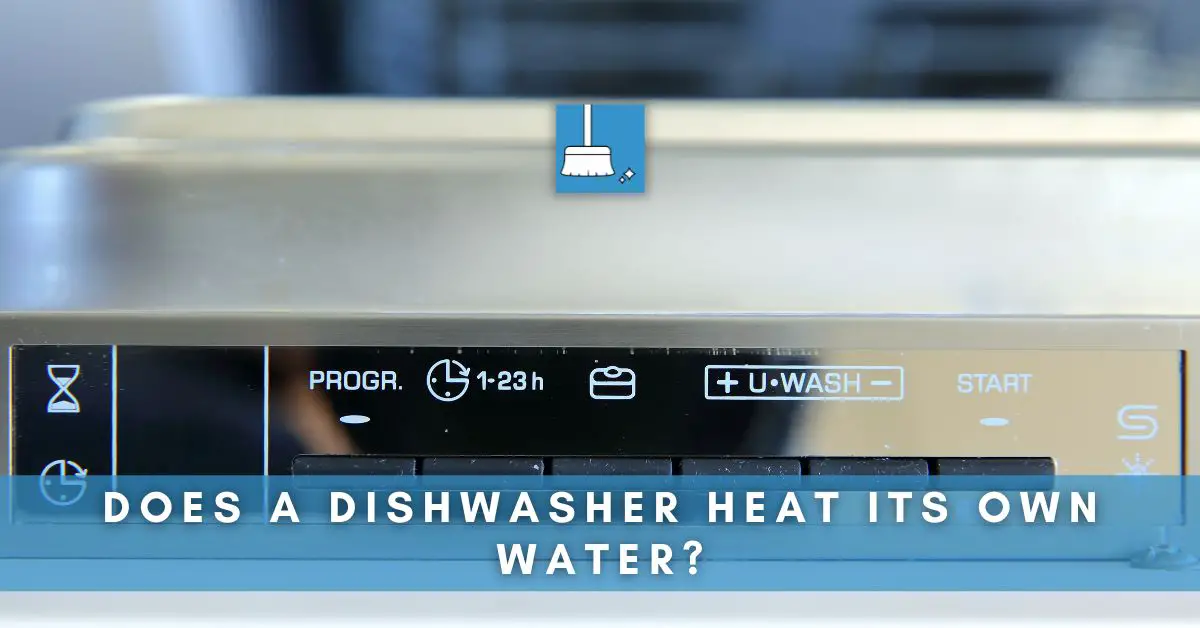Are you experiencing issues with your dishwasher? Or are you simply doing some research before purchasing a new one? Perhaps you’re just curious to have this piece of knowledge.
Whatever category you may fall under, one thing is certain – dishwashers are tremendously helpful. However, part of their effectiveness in cleaning dishes is arguably due to using hot water in wash cycles.
Therefore, you must be curious about how it works. Does a dishwasher heat its own water, or does it need to be connected to a hot water source? Keep reading to find out the answer to this question and more.
Does a Dishwasher Heat Its Own Water?
Most dishwashers have built-in water heating mechanisms to heat their water. Your average traditional dishwasher likely has this feature, but a smaller countertop dishwasher may not.
Here is a comprehensive table of what dishwasher brands heat hot water and which don’t.
| Dishwasher brand | Heats water | Has Preheating Feature |
|---|---|---|
| Whirlpool dishwashers | Yes | No |
| Bosch dishwashers | Yes | Some do |
| Samsung dishwashers | Some do | No |
| GE dishwashers | Yes | Some do |
| KitchenAid | Yes | No |
| LG dishwashers | Only heats water in the rinse cycle | No |
| Asko dishwashers | Yes | No |
Different Types of Heating by Dishwashers
Some dishwashers only heat water up by an extra 10 or 15 degrees, so they still need to be connected to a hot water source.
The recommended average temperature for dishwasher water is between 120 and 150 degrees Fahrenheit. Since the water coming from your water heater is not likely to be this hot, these dishwashers will increase the temperature.
For dishwashers that need a hot water supply, there is a way to get hot water in the dishwasher faster. You need to open the kitchen sink faucet to let the cold/lukewarm water run out till the water gets hot. After this, you can switch on your dishwasher and let the already hot water enter it.
Dishwashers that can heat their water from scratch are usually more energy-efficient than those that do not. This is because getting hot water from a source will invariably lead to heat loss as the water travels down. Manufacturers of such dishwashers usually encourage you to connect them to your cold water supply.
For dishwashers that heat their own water, some have a preheating feature. The preheating feature is designed to save time and make your washing cleaner.
In a washing cycle, heating the water to the required temperature usually prolongs it. However, preheating allows you to run a cycle before loading the dishwasher.
In the preheating cycle, you fill the dishwasher with water, and the dishwasher heats it to the required temperature. Then, you can proceed to load the dishes and start your wash cycle. Since your dishwasher begins with a hot wash, your plates will get cleaner faster, and wash time will reduce.
Pros of Hot Water in Dishwasher
● Hot water makes it easier for food stains and grime to come off dishes.
● Dishwasher tablets dissolve faster in hot water than in cold water.
● With hot water, your dishes are washed and sterilized because the heat helps kill some bacteria.
Cons of Hot Water in Dishwasher
● Heating water consumes more energy than room temperature water.
● You may not be able to wash dishes made from some materials, e.g., certain glasses and plastics, in hot washing cycles.
How Does the Water in the Dishwasher Get Heated?
Water comes into the dishwasher via the water line and gathers in the dishwasher’s tub at the bottom. When it reaches the required amount, it stops, and the heating element at the bottom of the dishwasher heats it to the required temperature.
While the heating is going on, the wash cycle goes on, and the heating element stops once the optimum temperature is achieved.
Some dishwashers reheat during the cycle many times to keep the temperature constant. Most also heat the water during the rinse cycle and air in the dry cycle.
Some dishwasher brands like Bosch opt for a different heating mechanism. Rather than have a heating element at the bottom, the dishwasher heats the water as it flows through the respective routes in the dishwasher. This is known as a flow-through water heater type.
Can You Run a Dishwasher With Cold Water Only?
You can run a dishwasher with cold water only. Some dishwasher brands encourage you to connect the dishwasher to a cold water line and leave the heating job to the dishwasher. As long as your dishwasher can heat its water, you don’t need to connect to a hot water supply.
If, however, your dishwasher does not have a functioning heating system, running it with cold water will not harm it. However, you might find that your dishes are not as clean as they would have been with hot water.
How Much Hot Water Does a Dishwasher Use?
One of the reasons for the popularity of dishwashers, apart from their convenience, is that they save a lot of water.
Newer models of dishwashers conserve way more than their older counterparts do, but both conserve more than handwashing does. Modern dishwashers reuse water over and over in each cycle, filtering out the dirt to minimize the amount of new clean water they use.
According to the Natural Resources Defence Council, handwashing can consume up to 27 gallons per load. In comparison, dishwashers can use as little as 3 gallons per load for the Energy Star certified ones.
Energy Star also states that their certified dishwasher machines could save you as much as 3,870 water gallons throughout their lifespan.
How Long Does It Take for a Dishwasher to Heat Up?
According to several experts, it takes about two minutes for a dishwasher to heat the water by 1 degree. This can significantly lengthen the cycle time if the water entering the dishwasher is very cold.
However, dishwashers with preheating features combat this by allowing you to preheat the down before you are ready to wash. Such dishwashers usually have mechanisms to reduce heat loss to the minimum. This way, wash time is reduced when you load the dishwasher because the water is already hot enough or almost.
Some Bosch dishwashers have a Turbospeed setting that helps you save time in a rinse cycle. It preheats once before the cycle – this takes approximately 25 minutes. It then runs several rinses consecutively without any need to heat again.
How Do I Know if My Dishwasher Heater Is Working?
You can do any of the following things if you want to confirm that your dishwasher heating element is working:
1- Examine the Dishwasher’s Performance
Using hot water to wash generally delivers great cleaning performance compared to clean water. If your dishwasher is washing those tough stains well, your heater is probably in good shape.
2- Check the Temperature
After a wash cycle or any other cycle, if you open your dishwasher, you should feel the warmth. Your dishes should also be warm to the touch if the dishwasher washed them with hot water.
3- Physically Examine It
You can take a look at your heating element to make sure that it is in good shape. Check for cracks or any blistering.
4- Test It for Continuity
This will only work if your dishwasher does not use a flow-through heater. If everything points to the fact that you may have a broken heater, this test can help you become certain. To do this, you will need a multimeter.
The steps include:
STEP 1: Uninstall the dishwasher
STEP 2: Take out the heating element from the bottom of the dishwasher
STEP 3: Put your multimeter in the lowest setting for Ohms
STEP 4: Touch the tip of each probe to the respective ends of the heating element.
STEP 5: If the result is between 10 and 50 Ohms, your heater is fine.
STEP 6: However, if there is no change or an insignificant change in the result, your heater is broken.
If this procedure seems daunting, you can hire professional help, so you don’t accidentally spoil anything in your dishwasher.
Why Is the Water in My Dishwasher Not Getting Hot?
Here are a few reasons your dishwasher is not heating water:
1- Your dishwasher heater may be spoilt. It could be time to replace it. You can test it for continuity (an unbroken path for current flow) before deciding whether or not it needs replacement.
2- The temperature sensor could be broken. Its job is to detect and monitor the temperature of water in the dishwasher. If it is broken, your dishwasher may be unable to heat well or at all.
3- A defective dishwasher thermostat may be making it impossible for your dishwasher to detect whether it has reached optimum washing temperature or not.
4- You may have a dishwasher that does not heat up. For example, some LG dishwashers only maintain the temperature of the water that enters them. They don’t do any heating until the rinse cycle.
Do Portable Dishwashers Heat Water?
Portable dishwashers come in different brands and designs. Some stay on the countertop, while some others can be located elsewhere. Many can heat their water, but many countertop dishwashers get hot water from the kitchen faucet.
They have a setup kit that you can use to connect them to the hot water from the kitchen sink. Confirm with the manufacturer what heating model the portable dishwasher you plan on purchasing has.
Final Thoughts!
The heating feature of dishwashers is one of its most crucial features. Knowing how it works in your dishwasher can help you easily detect faults and understand your dishwasher better. Also, with this knowledge, you will know the right questions to ask if you decide to purchase a new one.





